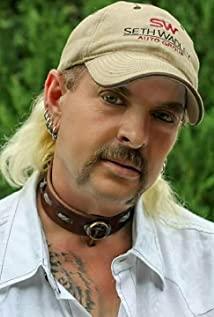Two weeks ago, in the " Guns, Sex, Animals, "The Director of "Raising Tigers" expected this documentary to become a hit " (click the blue title to go directly to the article), we recommended that the United States was popular during the epidemic. In the Netflix documentary series "Raising Tigers in Trouble", the strange characters and jaw-dropping magical plots in the film provide a space for people to escape when the new crown is rampant.
At the end of the article, the translators also summarized some calmer analyses and criticisms of this series. One of them is the out of focus on the subject of animal protection. This new film review attempts to explain to the public what "Raising a Tiger" has done wrong.
Why "Raising a Tiger in Trouble" is not the big cat version of "Black Whale"
Author: Rachel Nuwer
There are more tigers in the U.S. in people's backyards, private zoos, and truck stops than all wild tigers in the world. This situation is caused by people like Joseph Maldonado-Passage, who is a star in Netflix’s hit documentary series, and is well-known by the public as "Joe Exotic" (Joe Exotic ).
Before he was arrested and sentenced, Joe Wild was a large breeder and trader of tigers and other big cats. He quickly breeds tiger cubs in large numbers for tourists to take pictures and have fun to make money. When the tiger cubs grow up and are no longer safe, he disposes of them legally or illegally. Some were sold to private buyers, some were sent to other roadside private zoos to continue breeding, and some disappeared out of thin air.
"I call this the breeding and discard cycle," said Carney Anne Nasser, director of the Animal Protection Law Clinic at Michigan State University School of Law. She said that tiger cub breeding and commercial use "caused the tiger crisis in the United States", and widespread animal abuse and lack of federal government control have deepened this crisis.
Many interviewees of "Raising Tigers in Trouble" said that when this project was introduced to them, they said it would expose the private ownership of big cats in the United States, and it was in line with many documentaries on animal protection.
Some people even revealed that Eric Goode and Rebecca Chaiklin, the co-directors and co-producers of the series, claimed that they were working on the big cat version of "Black Whale." . "Black Whale" is an award-winning documentary in 2013, which promoted widespread non-government boycotts of the marine world.
However, "Black Whale" producer Manny Oteyza (Manny Oteyza) said: ""Raising a Tiger in Trouble" is not a big cat version of "Black Whale."
Dr. Nasser pointed out that the various problems affecting the big cats have disappeared in the "soap opera-like exaggerated plot" of "Raising a Tiger in Trouble".
"Raising Tigers in Trouble" tells the success of Joe Wild, he changed from a roadside zoo character to the country's largest tiger breeder; it also tells that he fell into a big decline and became a criminal afterwards. After being sued by Carole Baskin, he became obsessed with destroying her and planned to kill her. Baskin is an activist for Big Cat Conservation and the owner of Big Cat Rescue, an officially recognized animal shelter in Tampa, Florida.
Critics worry that "Raising Tigers in Trouble" will strengthen the appeal of tigers' private rights, give Joe the personality of wild folk heroes, and hinder efforts to end the abuse and privatization of big cats.
"We will see more people taking selfies with tiger cubs, and more people wanting tiger cubs." said Tim Harrison, a retired police officer and wildlife expert in Dayton, Ohio. He declined the interview for "Raising Tigers in Trouble" because the show "sounds like it might turn into a deformed show" to him.
On Wednesday, a reporter interviewed President Trump and asked him if he would consider pardoning Joe Wild. Trump replied that he was not familiar with this case, but would "go and see."
Karl Ammann is a documentary filmmaker whose work focuses on exposing the illegal wildlife trade. When Goode and Chai Kelin invited him for an interview, they told him that this documentary was an opportunity to show the plight of wild tigers. However, he said that the final film does not have any clear meaning of animal protection. Oman said: "It's a pity to completely ignore these important contents."
Representatives of Goode, Chaikelin, and Netflix all declined my interview.
Documentaries about animals and the environment can attract viewers' attention to nature and promote positive changes, so most of them are praised.
Nancy Rosenthal, the founder and executive chairman of the New York Wild Film Festival, said: "Black Whale is the most typical example." After the documentary was released, Sea World’s stock fell, and then in 2016, the company announced the end of its killer whale breeding program and whale show.
Other documentaries have the opposite effect to their purpose. The Oscar-winning film, "Dolphin Bay" in 2009 tells the story of the annual hunting of dolphins in Taiji Village, Japan, which has aroused global anger.
However, Sasaki Meeho, director of the documentary "Fables of the Whale", which explored the rest of the "Dolphin Bay", said that "Dolphin Bay" also triggered resistance to the film in Japan, and instead strengthened people's defense and defense against the fishermen in Taiji Village. support.
She said: "When someone comes and tells you,'Hey, it's wrong to eat those animals', it arouses people's emotions. All people in Japan, even those who don't care about whaling, feel that they are under attack. ."
Critics of "Raising a Tiger in Trouble" worry that the discussions caused by this series, especially those about extremely unusual characters, will have a similar effect.
The protagonist, Joe Wild, is serving 22 years in prison for 17 wildlife crimes (including trafficking in endangered species and the illegal killing of 5 tigers, etc.) and two murders by hiring someone.
In the court that tried him, the federal government provided a lot of evidence to prove his crime, including a 45-minute recording. In the recording, he discussed his plan to murder Ms. Baskin with an undercover FBI agent.
Federal Attorney Timothy Downing of the Western District of Oklahoma said: “The Department of Justice is firm from beginning to end, and the court records, evidence, and trial testimony fully support the jury’s verdict is correct.” But social media's reaction. It highlights that after watching this series, most people have sympathy for Joe Wild's understanding.
On Twitter and other social media, topics such as "Release Joe Wild" and "Justice Return to Joe" have been popular, which also shows that many viewers believe that he was framed for murder. Director Goode said in an interview with Time Magazine that Joe Wild was ecstatic because of the response of "Raising Tigers".
James Garretson, who worked with the FBI to collect evidence to prosecute Joe Wild, said: "I don't know why someone would support a person who kept animals in a cage and then shot them. . People are like crazy now."
Documentary creator Steven Cantor said that for entertainment and storytelling needs, some documentary directors can accept a slight deviation from reality, or take the initiative to influence the behavior, speech or appearance of participants. He said: "A work called a'documentary' does not mean that everything in it must be 100% authentic. You can enhance certain stories, which is not a deception."
But critics of "Raising a Tiger in Trouble" insist that director Goode and Chai Kelin have done too much. Sometimes they will take what the characters say or the shots taken out of context, place them in a context that does not match the reality, present inaccurate information as facts, and deliberately confuse the timeline.
These problems are especially reflected in how the series portrays another protagonist, Baskin. She is the target victim of Joe Wild and is working with other proponents to pass a bipartisan bill to prohibit commercial use of big cat cubs and phase out the private ownership of tigers. This bill is currently under evaluation by the House of Representatives.
Baskin said that since the documentary went live, she has been surrounded by various concerns, many of which are abusive remarks and death threats. Fans of Joe Wild have created 12 Facebook events, threatening to rush into her animal shelter.
Some people's disgust towards Baskin may come from the choices made by the creator when presenting the story. For example, she and other critics claimed that the way the material in the film was edited suggested that the animals she cared for were kept in cramped, dirty cages. In fact, the smallest fence in her shelter is 1,200 square feet. The Global Federation of Animal Sanctuaries believes that this area is humane for the animals that live in it.
Michael Webber is the director of "The Elephant in the Living Room," which is also a documentary about private ownership of wild animals. He said that some of the clips in "Raising a Tiger in Trouble" made Baskin and her animal sanctuary look "as bad" as Joe Wild's zoo, which is what Joe Wild has been trying to indoctrinate for more than a decade.
Weber said: "They present an illusion, as if someone like Baskin who has a legal shelter is indistinguishable from Joe Wild, but this is completely contrary to the facts."
Court testimony also showed that Goode and Chai Kelin paid Joe Wild and other participants. The producer of "Black Whale" Ortesa said that reality show creators will regularly compensate participants, but documentary creators traditionally do not pay participants.
Chai Kelin told the Los Angeles Times that she and Goode only paid for the adaptation of the life story, the use of archives and personal videos, and the licensing fees for the filming location, and did not spend money for people to be interviewed.
She said: "In principle, we will never pay for interviews."
However, the six interviewed figures in this series, including the main characters John Finlay and James Garretson, all claimed that they were paid hundreds to thousands of dollars in cash.
Joe Wild’s former friend Jeff Johnson runs a popular group of Joe Wild Watchers. He said that Goode "tells me very directly that he needs me to send him some text messages, some photos, etc., so that he can justify paying me."
"Raising a Tiger in Trouble" is a product of the rapidly changing film and television industry, and the boundaries between documentary and fiction are becoming increasingly blurred.
"Documentary, entertainment, and reality shows are all mixed together." explained Marcia Rock, director of the New York University News and Documentary Program and also a documentary creator. Because of the financial incentives provided by some online streaming media, "producers are tempted to move in that direction."
The success of film and television programs such as "Raising a Tiger in Trouble" may encourage more projects to blur the boundaries between documentaries and reality shows. Some film and television workers worry about the social consequences of this trend.
The documentary filmmaker and screenwriter Glen Zipper (GlenZipper) said: "I believe that film and television are the most influential mediums available. If the creators convey false facts to the audience, it is especially relevant. False information on important issues, such operations will eventually lead to dangerous consequences."
Original link: https://www.nytimes.com/2020/04/09/science/tiger-king-joe-exotic-conservation.html
Recommended reading: "Netflix's Documentary Strategy"
Translator: Wang Sanyang, Sunny
Editor: Zhang Wei
View more about Tiger King reviews











